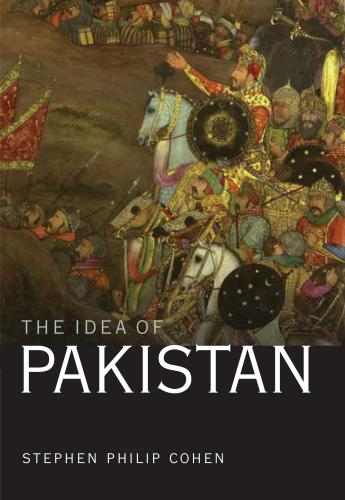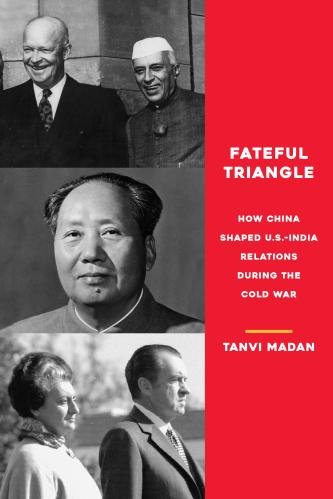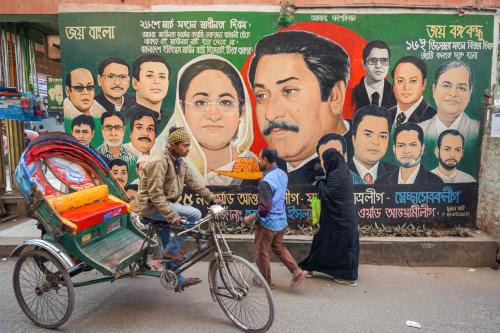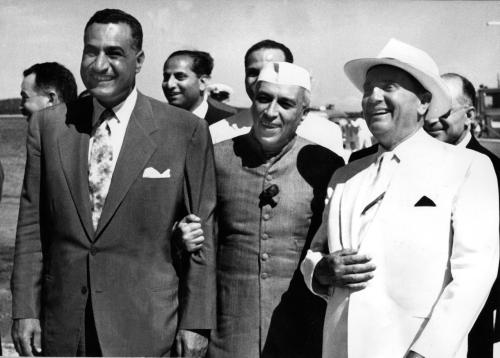Stephen P. Cohen was a valued member of the Brookings family for 21 years, from 1998 until his death following an illness on October 27, 2019. You can learn more about his renowned work on South Asia here.
Michael E. O’Hanlon (@MichaelEOhanlon), Senior Fellow and Director of Research for Brookings Foreign Policy: I was here at Brookings for the entirety of Steve Cohen’s stint here — though of course, those 15 years or so represented only about a quarter of his remarkable career as the effective dean of India and South Asia studies in the United States for about half a century.
His students are legion and are extraordinary as a group, largely because they learned from the master. I hope that many of them will be writing about him, too. I have been fortunate to know several myself. Without exception, they are bright, humorous, and passionate about their work — which is no coincidence, since Steve was all these things.
Steve was hopeful in his outlook, for India and South Asia and humanity in general, but also realistic and patient. In addition, he had a dry and somewhat sardonic wit, but with a light and kind touch, that made it easier to handle all the inevitable setbacks, and slow pace of progress, in the part of the world he studied. Yet I think he was also gratified towards the end of his career to see India in particular making the kinds of progress that he had always known to be possible. The last chapter of his seminal 2001 book, “India: Emerging Power,” was appropriately entitled “India Rising” — and much of what he forecast there continues to unfold before our eyes.
That volume, along with his equally brilliant “The Idea of Pakistan,” were two of my favorite Brookings books of all time. They provide a model that I wish more of us would follow! In about 300 pages each, they described the country at issue — its people, culture, ancient and modern history, politics, economy, security challenges — concisely and elegantly. I loved the history sections in particular, because they told me just what I needed to know, and no more. They were also graced by some of the best artwork ever to appear on the cover of a Brookings book — perhaps not Steve’s direct doing, but still somehow fitting, given his sophisticated understanding and love for those countries and their peoples.
One more word about his many books. His coauthored volume, “Arming without Aiming: India’s Military Modernization,” was written by Steve with Sunil Dasgupta, a former student. Again, his decision to collaborate on this book was an example of Steve’s commitment and dedication to his students. The process of editing it was also a testament to his good cheer, lack of ego, and willingness to work hard to make a good piece of writing even better. As director of research here then, I read the book in draft and thought it had one significant limitation that, if fixed, would make it far better. Many authors don’t appreciate such feedback! Steve and Sunil took it in stride, and as I recall, took my suggestion and found an even better way to make the fix than I’d recommended.
I still remember when Benazir Bhutto visited Steve at Brookings some years before her death. And I still remember how, thanks to Steve and our fellow Brookings colleague Strobe Talbott, a delegation of us had visits with, among others, the young Gandhi in India in the early 2000s. But while I’m grateful for such visits, I’m hardly surprised that they happened. How could anybody who was anybody in regards to South Asia not want to see Steve?!
Let me conclude with a shout-out to Richard Haass, who had the good sense to recruit Steve to Brookings, as well as to subsequent directors and vice presidents of Brookings Foreign Policy who also championed his scholarship. And a final thank you to Steve for doing so much to inspire and shepherd Tanvi Madan in her student days and early career; she is now one of our great young scholars at Brookings, and a living testimony to what Steve accomplished in his remarkable life and career.
Dinshaw Mistry, Professor of Political Science and Asian Studies at the University of Cincinnati: It would be fitting to honor Stephen Cohen by recalling his rich scholarship and its policy relevance. His book India: Emerging Power (2001) appropriately noted that revived American interest in a rising India should be welcomed, though the United States and India would have to avoid inflated expectations. Another book, Shooting for a Century: the India-Pakistan Conundrum (2013), astutely observed that the India-Pakistan conflict could endure for decades. It suggested a policy of “do no harm, but do something,” where “American help is a necessary but not sufficient condition for regional normalization.” We owe Steve a tremendous debt for these and other writings that remain timely years after they were written.
Bruce Riedel, Senior Fellow in the Center for Middle East Policy at Brookings: Steve Cohen is a path breaker in the field of South Asia studies. His original research and analysis on India and Pakistan set the bar for the students of the region. Steve went beyond the political process and exposed the underlying assumptions, ideologies and power balances that shape the future of India and Pakistan. He provided unique insights into how the two countries behave and interacted. His works are classics.
Steve had a demonstrable influence on American policy toward South Asia. I can attest to his input. In 2000 Steve Cohen was one of the outside scholars I invited to the White House to help brief President William Jefferson Clinton before his historic visit to India and Pakistan. A decade later in 2009 I involved Steve in the deliberations for President Barack Hussein Obama’s Afghanistan/Pakistan policy. He had impact each time. Steve’s legacy will endure both in his books and the students he mentored.
Dhruva Jaishankar (@d_jaishankar), Director of the U.S. Initiative at the Observer Research Foundation: As I write in more depth here, Steve Cohen was an institution unto himself. He will always be remembered for his eagerness to mentor young scholars, and not just his students and assistants. I was but one of several research assistants at Brookings — Dinshaw Mistry, Sunil Dasgupta, Tanvi Madan, Anit Mukherjee, and Constantino Xavier being others — to have been fortunate to have worked under him. Such an intense apprenticeship enabled us to know Steve not just as a scholar but as a human being. His passion for jazz, tennis, fast cars, Mac computers, and the Chicago Bears was matched only by a wry sense of humor. He will be deeply missed but also celebrated for his personal warmth and loyalty to countless beneficiaries in India, Pakistan, the United States, and around the world.
The Brookings Institution is committed to quality, independence, and impact.
We are supported by a diverse array of funders. In line with our values and policies, each Brookings publication represents the sole views of its author(s).









Commentary
Brookings colleagues past and present remember Stephen P. Cohen
November 1, 2019